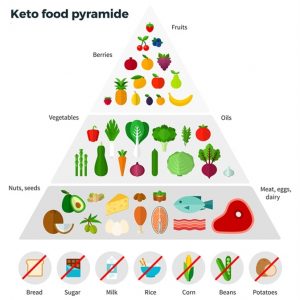Ketones: they’re the syrup-like answer to our cells’ energy needs. But what are they, and how can we use them to support and optimize our body and its performance? Let’s dive into the science of ketones: the fuel of the body.
Table of Contents
- 1. What Is Ketone: An Introduction
- 2. Understanding How Ketones Work in the Body
- 3. Exploring the Benefits of Ketones
- 4. Integrating Ketones into Your Diet
- 5. Wrapping Up: Final Thoughts on Ketones as Fuel for the Body
- Q&A

1. What Is Ketone: An Introduction
Ketones are organic compounds that are naturally produced in the human body during times of low food intake, high-intensity exercise, and starvation. They act as an alternative fuel source when carbohydrates are not readily available, and are responsible for triggering the breakdown of stored body fat for energy.
When our bodies choose to access ketones for fuel, it’s known as ketosis. This process involves the body:
- Breaking down stored body fat into molecules called ketones
- Using the ketones in cells instead of glucose
- Releasing energy slowly and steadily
Ketones are a normal and essential part of human physiology, providing the body with fuel during times of stress or deprivation. While most of us rarely need to access our fat stores to produce ketones for energy, there are certain situations where our bodies rely on them as an energy source. For example, some people with diabetes rely on ketones to manage their blood sugar levels.
2. Understanding How Ketones Work in the Body
Ketones play a key role in the body’s metabolism. They are produced in the liver when there is an insufficient amount of glucose in the bloodstream: normally, when you go for more than three hours without eating. A hormonal cascade is triggered and stored fat is broken down into ketone bodies, which are then released into the bloodstream.
Ketone bodies serve as an alternative energy source for organs such as the brain, heart, and muscle. They stockpile energy from fat cells, providing up to 70% of the body’s energy needs. In addition, they reduce the body’s need for glucose. This increases longevity and could lead to improved fertility. Thanks to ketones, the body can rely on both glucose and fat as energy sources.
- Fat cells provide up to 70% of the body’s energy needs.
- Ketones stockpile energy from fat and reduce the need for glucose.
- Ketones enable the body to rely on both glucose and fat.
3. Exploring the Benefits of Ketones
Ketones offer a number of health benefits that make them appealing to people looking to lose fat and boost their physical performance. From regulating energy levels in the brain and body to helping kickstart fat-burning, these naturally-occurring molecules can help you achieve your health goals.
More Energy – Unlike glucose, the sugar broken down from carbohydrates, ketones can provide frequent energy throughout the day. The body can preserve ketones, meaning that you can enjoy sustained energy without any jolts or drops. Using ketones may give you an edge when it comes to getting things done.
Boosting Fat-Burning – One of the main areas ketones can aid is in fat loss. When the body is deprived of energy from carbohydrates, it naturally begins to burn fat and produce ketones. This process is called ketosis, and helps achieve the goal of losing weight quickly and efficiently.
Ketones also offer additional health benefits, such as stronger immunity, improved digestion, and better brain health. To achieve these benefits, you can take ketone supplements, or you can incorporate more leafy greens, healthy fats, and fiber into your diet.
- Ketones help regulate energy levels in the body
- Ketones may help kickstart fat-burning
- Ketones offer additional benefits such as improved immunity
- Ketone supplements or increasing your intake of leafy greens, healthy fats, and fiber can help increase ketone levels
4. Integrating Ketones into Your Diet
If you’re looking to integrate ketones into your diet, you’ve come to the right place. Not only do ketones offer a powerful source of energy, the right kind can help you reach your nutritional goals and maintain a healthy lifestyle. Here’s how to get started:
Do your research: The key to making the most of ketones in your diet is to do your research ahead of time. Talk to your healthcare provider and talk to other experts to understand what kind of ketone supplement is best for you. Make sure you’re familiar with the ingredients, including the ones that can potentially interact with your existing medications or supplements.
Start small: Once you’ve identified the right ketone supplement for you, it’s time to start . A good place to start is by taking a small dose every day, then gradually increasing your intake as your body adapts. Some of the things you must keep in mind include:
- Monitor your physical and mental health closely and adjust doses accordingly.
- Follow the recommended dosage instructions from the manufacturer.
- If you experience any side effects, lower your dose and consult with your healthcare provider.
Maintain a balanced diet: Even if you’re taking ketone supplements, it’s important to maintain a balanced diet and make sure you get the vitamins and minerals your body needs. Eating the right amount of fruits, vegetables, proteins, and healthy fats will help ensure you get the most out of your ketone supplements.
5. Wrapping Up: Final Thoughts on Ketones as Fuel for the Body
In summary, ketones are a great source of fuel for the body. They are efficient, supplying the body with energy for long periods of time with little effort from the body itself. Not only do they provide energy, but also help with weight management, improved mental performance, and increased health. There are a few things to consider when introducing a ketogenic diet, such as dietary changes and understanding how your body will adapt to the new fuel sources.
The ketogenic diet is quite powerful, as research is proving, and is likely to become an increasingly popular dietary lifestyle for those looking to optimize their health and performance. It is important to remember that these extraordinary benefits come with a big responsibility. Monitoring your health and ensuring you are getting the necessary nutrients and vitamins is essential to ensure the body is functioning optimally.
- Ketones help power the body for long periods of time.
- The ketogenic diet supports weight management and health.
- When starting a ketogenic diet, consideration must be taken for dietary changes and how the body will adapt.
- Ketones are a powerful source of fuel and are likely to become an increasingly popular lifestyle choice.
- Monitoring health is essential to ensure the body is functioning optimally.
Ketones are a vital and important energy source for our bodies. They are produced in the liver and circulate in the bloodstream, providing energy for the cells throughout the body. They are an important part of any health program, so understanding the function of ketones in the body is essential. With the right knowledge and approach, you can put ketones to work for you and create a healthier and more sustainable lifestyle.











